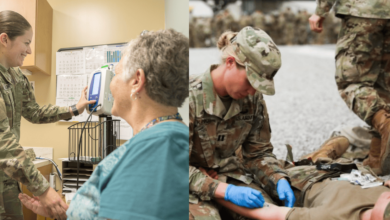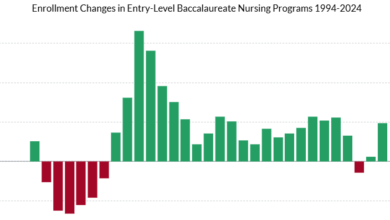Revamped social care councils vow nurses will be heard

Adult social care nurses have declared that they are not just taking a seat at the table, they are “bringing people to our table” and making sure their voices are heard across the whole healthcare system.
They are fulfilling this mission through the newly relaunched Social Care Nursing Advisory Councils (SCNACs) across England.
“It’s bringing people to our table in a meaningful way, which puts adult social care in the chair and at the driving force of that”
Anthony Birmingham
The SCNACs were the brainchild of England’s chief nurse for adult social care, Professor Deborah Sturdy, and are being led by nurses on the ground.
Initially set up in 2022 as 42 separate SCNACs – one for each integrated care board (ICB) area – the councils failed to get the engagement needed to take off and it became clear a rethink was needed.
Now, the SCNACs have been reformed into seven regional councils, with funding from the government to help with administration and a reignited motivation both to raise the profile of adult social care nursing and to influence discussions on health and social care locally and nationally.
Three leaders from the councils have spoken to Nursing Times about their hopes and ambitions for the SCNACs.
Anthony Birmingham, chair of the North East and Yorkshire SCNAC, said: “I think, for me, it’s about us bringing together and actually celebrating us – and being able to show that there is a place for nursing in adult social care and us getting that meaningful place around the table.
“Well, I suppose… it’s bringing people to our table in a meaningful way, which puts adult social care in the chair and at the driving force of that. That’s what people need to see.”
He added that changing the perspective on adult social care nursing and showing the value of a career in the sector was a “massive driver” for him.

Anthony Birmingham
As a registered learning disability nurse (RNLD) working in adult social care, Mr Birmingham noted how both learning disability and social care nursing were struggling with the same workforce challenges.
“I’m an RNLD and there’s lots of discussion of how we reinvigorate learning disability nursing, how we bring more people to the field. That’s the exact same question we talk about in social care,” he said.
“Because people aren’t always thinking that there are the career prospects, [they think] ‘there aren’t the pathways, there aren’t those leadership and strategic options in social care, so why would I go?’ But absolutely there are, people just don’t know.”
Each SCNAC has a chair like Mr Birmingham as well as a co-chair and, among their members, are representatives from across the social care sector locally, including nurses working in care homes, hospices, domiciliary care, learning disability and mental health services, and complex care services.
There is also representation from education and workforce bodies as well as the Royal College of Nursing regional lead nurses for independent health and social care.
Importantly, each SCNAC will include the regional chief nurse at NHS England and the chief nursing officers (CNOs) from the local ICBs, in order to support partnership working and information sharing between nurses in adult social care and the NHS.
The chairs and co-chairs of the SCNACs will then feed into the national agenda by meeting once a month with Professor Sturdy, who is based at the Department of Health and Social Care (DHSC).
“We’re actually, clinically, hugely accountable nursing professionals, as opposed to just an aside to the NHS”
Scarlett MacDonald
Scarlett MacDonald, co-chair of the South East SCNAC, said she wanted to make sure that adult social care was given parity with the NHS.
“It’s about bringing social care to the table so that we can secure [its] future,” she said.
“Because it isn’t the poor sister to the NHS, we’re actually, clinically, hugely accountable nursing professionals and [the] social care nursing profession, as opposed to just an aside to the NHS. It’s hugely important to the thousands of people we look after every day.”
It was her view that reducing the number of the SCNACs from 42 to seven would “support the sustainability” of them, as she noted how most of those involved in the councils were doing it on a voluntary basis alongside their normal jobs.

Scarlett MacDonald
The SCNACs have national priorities on which they are all working that cover the big topics of education, training, and workforce planning and development, as well as regional priorities agreed locally and shaped by feedback from those nurses working in services.
“It’s not a case of us telling them what we think the priorities are. [They’re] formed by the people who are the key leaders within the sector,” said Ms MacDonald.
She said one of the aims of, and challenges for, the councils would be trying to bring together all the different providers and organisations involved in social care in a region, noting how the sector was “disparate”.
In particular, she said the SCNACs would be seeking to serve the nurses working in small organisations with limited access to peer support from other nurses.
“When you’ve only got one nurse in a [care] home, it’s hard. So actually, it’s about the small organisations and those nurses working in isolation, and getting them into the big group of nursing,” she said.
“Social care is very rarely at the table making decisions, and that’s what’s going to happen from now on”
Zoë Fry
Echoing this point, Zoë Fry, who is chair of the South East SCNAC, said many adult social care nurses were “very isolated” and the ambition was to change that.
Ms Fry is also the executive director of The Outstanding Society, which is hosting the SCNACs and delivering the administrative support via the DHSC money.
She said one of the things that would be important for the success of the revamped SCNACs would be communication and making sure that all adult social care nurses had the opportunity to contribute to, and be kept up to date on, the work of the councils.
“So how is this information getting to adult social care nurses? And the voice of those adult social care nurses [getting] back into these councils?,” she said.

Zoë Fry
“And also [how do we] identify leaders of the future within the sector, because it is quite an isolated sector. That is going to be absolutely crucial.”
She added that some of the early themes coming through, in terms of priorities, included how social care nurses can maintain clinical competencies, ensuring training opportunities are available and boosting research in adult social care.
On the training point, Ms Fry said social care nurses needed “equity” with their NHS counterparts, adding: “Why can’t adult social care nurses have the same access as NHS nurses?”
One of the ways the SCNACs would advocate for social care nurses would be by making sure they were represented on key projects happening across healthcare – for example, those being organised by the local ICB – explained Ms Fry.
She said: “What we expect to be seeing is if the [ICB] CNO comes to the regional meeting and says, ‘Well, we’ve got a clinical reference group that looks at hospital discharges, delays in the system’, the question we’re going to be [asking] is: ‘Have you got a representative from adult social care on that group?’
“Often the answer is ‘no’. So then we can find the relevant representative to sit on that group within the ICB.”
With the general election taking place this month, Ms Fry said this presented an opportunity for adult social care and that she saw the SCNACs as having a “really close link to the government”, via Professor Sturdy, in the future.
She noted how, in September, a first-of-its-kind event for adult social care nursing – akin to the CNO Summit for NHS nurses – would be taking place, chaired by Professor Sturdy and facilitated by the SCNAC chairs and co-chairs.
At this event, they would be laying out what the sector wanted and the direction in which it wanted to go, said Ms Fry.
Going forward, the plan is that the SCNACs will be “a reliable source of advice for [all] matters [relating to] adult social care nursing” for those both inside and outside of the profession, she added.
“Social care is very rarely at the table making these kinds of decisions, and that’s what’s going to happen from now on,” said Ms Fry.
“And what’s so key is the CNOs are really, really engaged with this as well. So, it’s fantastic. The joint working we’re going to have across health and social care is absolutely amazing.”






